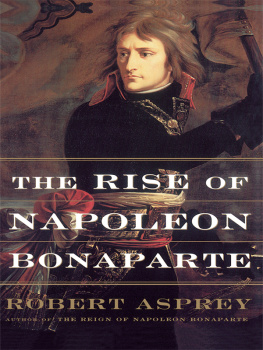CITIZEN EMPEROR
BY THE SAME AUTHOR
Napoleon: The Path to Power, 17691799
Talleyrand
Theatres of Violence: Massacre, Mass Killing and
Atrocity throughout History (co-editor)
Napoleon and his Empire: Europe 18041814 (co-editor)
The French Revolution and Napoleon: A Sourcebook (co-editor)
Napoleon and Europe (editor)
Modern Prussian History, 18301947 (editor)
The Rise of Prussia, 17001830 (editor)
CITIZEN EMPEROR
NAPOLEON IN POWER
PHILIP DWYER

Published with assistance from the Annie Burr Lewis Fund.
First published 2013 in the United States by Yale University Press and in Great Britain by Bloomsbury Publishing Plc.
Copyright 2013 by Philip Dwyer.
All rights reserved.
This book may not be reproduced, in whole or in part, including illustrations, in any form (beyond that copying permitted by Sections 107 and 108 of the U.S. Copyright Law and except by reviewers for the public press), without written permission from the publishers.
Yale University Press books may be purchased in quantity for educational, business, or promotional use. For information, please e-mailsales.press@yale.edu (U.S. office) or sales@yaleup.co.uk (U.K. office).
Maps by ML Design.
Typeset by Hewer Text UK Ltd, Edinburgh.
Printed in the United States of America.
Library of Congress Control Number: 2013950572
ISBN 978-0-300-16243-1 (hardcover: alk. paper)
A catalogue record for this book is available from the British Library.
This paper meets the requirements of ANSI/NISO Z39.48-1992 (Permanence of Paper).
10 9 8 7 6 5 4 3 2 1
For my mother,
Pat Dwyer
Victory is a Goddess greedy for death; her laurel is a branch dripping blood and soaked in tears.
Maurice de Tascher, Notes de Campagne
CONTENTS
REGENERATION, 17991802
1
The Invention of a Saviour
Neither Excitement nor Enthusiasm
It was still dark, the early hours of the morning of 11 November 1799. Bonapartes carriage stopped before a modest house in the rue de la Victoire where Josephine was waiting for him in bed in a state of nervous anxiety. They stayed up talking for a while, going over the events of the previous day. He learnt that his mother and one of his sisters, Pauline, had come to the house. They had been at the theatre when they heard the rumour that Bonaparte had just escaped an assassination attempt.
Bonaparte was just thirty years old. He still cut a relatively svelte figure although over the years he would become portly, if not obese. His dark-brown hair was beginning to recede. He had a scar on his leg where an English bayonet had once pierced him. His skin was sallow, and his eyes grey. He was five feet six inches tall with a slight build. He did not have any children, but he would eventually sire four or five, only one of them legitimate, and none of them with his first wife Josephine. By any standards, his had been a meteoric rise. Less than three years before, he had been a nonentity on the political and military scene. Now he was one of the major political contenders, and in time would become one of the most recognized men in European history, with a hat and a pose that is, his right hand in his vest or his hands folded behind his back that would become iconic. No one yet knew, however, what he was truly capable of.
Newspaper accounts of the previous evenings events had already appeared by the time Bonaparte awoke after a few hours sleep. It was 20 Brumaire in the Year VIII (11 November 1799), a dcadi, a rest day in the revolutionary calendar. At the Chteau de Saint-Cloud on the western outskirts of Paris, where the coup unfolded in the night of 1011 November, the conspirators had formed a new provisional government dubbed the Consulate because headed by three consuls, Emmanuel Joseph Sieys, Roger Ducos and Bonaparte. The trip from Josephines house in the rue de la Victoire to the Luxembourg Palace, where Bonaparte was to meet with the other two provisional consuls, was a short one. On his way, he would have seen people going about their daily business, taking a stroll on what turned out to be a mild, rainy day, gazing at the troops that had been positioned at strategic points throughout the city. Some stopped to read the proclamations posted on the walls of Paris explaining what had taken place, possibly relieved to discover that Bonaparte had escaped an assassination attempt against him, smiling perhaps at the story of the defenestration of the Five Hundred. The minister of police, Joseph Fouch, was doing his best to spread that one around the cafs and the theatres.
From a reading of the official explanations, plus the accounts given in some of the newspapers, it would have been apparent even to the most heedless observer that the coup had been Bonapartes, or that he was at least the central figure, and that therefore he was now nominally holding the reins of government. That is why reaction to the coup varied according to what one thought of Bonaparte, or conversely according to how much one detested the ousted regime that had been in power since the fall of Robespierre, the Directory. In Paris, Christine Reinhard talked of how the people were jubilant, and of how, even a week later, the enthusiasm for the new regime had not waned you would think that we had returned to the first days of liberty. This was portrayed as a positive thing. It is at the bottom of peoples hearts that this contentment resides.
Paris was not France, and for the moment nothing was certain. The Brumairians, as the conspirators were called (named after the month of Brumaire in the revolutionary calendar, the month in which the coup took place), did not know how the rest of the country was going to react, and that included the army.
The reactions in the administration were mixed too. A number of local authorities took the initiative and sent messages of adherence to the new authorities this was the case in the north and east of the country, that is, those areas under direct threat from invasion
This is why, ten days after the coup, the consuls decided to send one delegate to each military division (there were twenty-six in all), to carry the good news and to nip in the bud any signs of resistance to the changeover. The delegates, all officers, had far-reaching powers to suspend or replace public functionaries, to close political clubs and to post proclamations. Three weeks later, however, twenty departments had still not sent in congratulations. Even then, the letters received did little more than mirror the propaganda the new regime had already sent to the provinces. It has to be said, though, that most officials in the departments appear to have welcomed the coup, happier to be rid of the Directory than to see Bonapartes arrival on the political scene. Few were downright hostile.
In view of the rapid turnover of political personalities since 1789, many people did not expect the new regime to last very long. In the last ten years, there had been five governments the National Assembly (1789), the National Constituent Assembly (178991), the Legislative Assembly (17912), the National Convention (17925) and the Directory (17959) and the country had swung from absolute monarchy to a republic when the king, Louis XVI, was executed in 1793. After that, the Revolution lurched to the left as increasingly radical factions vied for power, culminating in the ascendancy within the Convention of a group known as the Jacobins and the formation of an executive, the Committee of Public Safety, dominated by one of the leading members of the Jacobins, Maximilien Robespierre.and hundreds of thousands died as a result of a bloody civil war. This was the Terror, which was brought to an end only when Robespierre was overthrown in 1794, meeting the same fate as his victims. The Directory that ruled France from 1795 to 1799 did a reasonably good job in the face of war and civil unrest, but was characterized by corruption, scandal, an egregious flouting of the electoral system, and a parliamentary coup.
Next page








